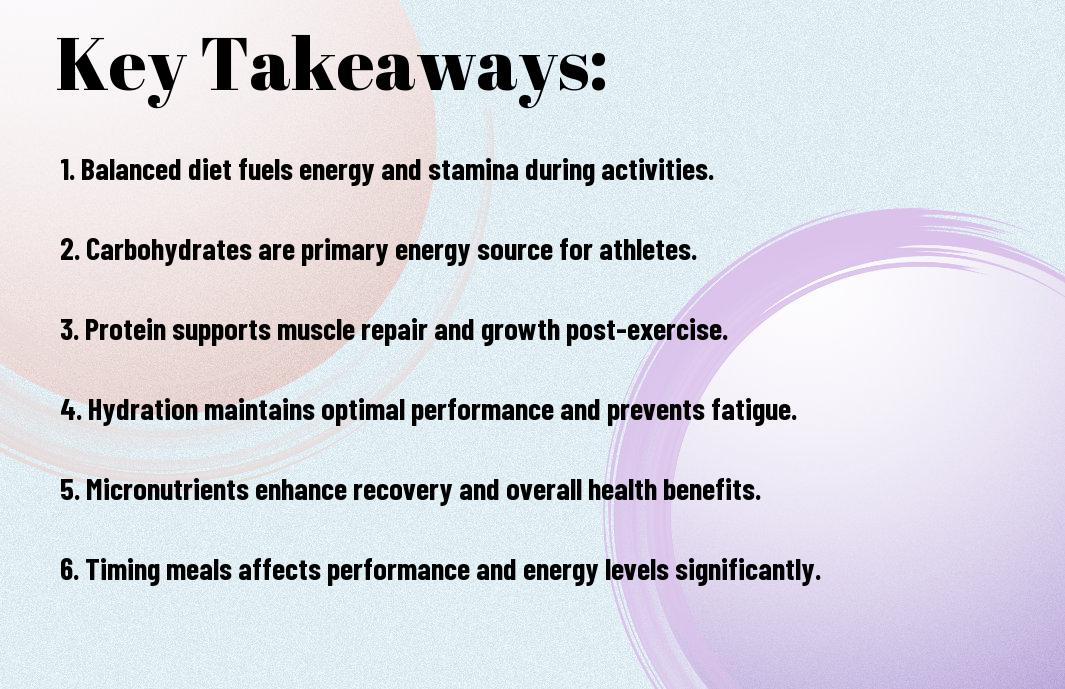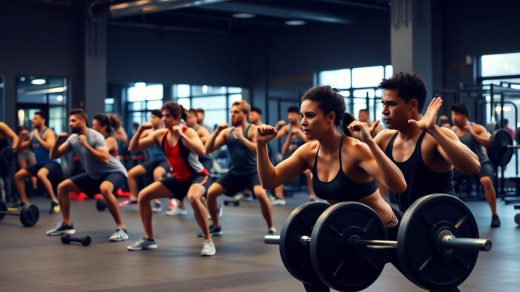It’s imperative to recognize that your nutrition plays a significant role in enhancing your sports performance. The food you consume not only fuels your body but also impacts your endurance, strength, and overall athletic capabilities. By understanding the importance of balanced meals and appropriate nutrient timing, you can optimize your energy levels, improve recovery, and ultimately reach your peak potential in your chosen sport. This post researchs into how nutrition influences your performance and provides practical tips to help you make informed dietary choices.
Key Takeaways:
- Energy Levels: Adequate nutrition is important for maintaining optimal energy levels during training and competition.
- Muscle Recovery: Proper intake of proteins and other nutrients aids in faster recovery and muscle repair after intense workouts.
- Hydration: Staying hydrated is vital for peak performance, as dehydration can lead to fatigue and decreased concentration.
- Endurance: Balanced carbohydrates can enhance endurance, providing sustained energy for longer durations of physical activity.
- Body Composition: Nutrition plays a significant role in achieving and maintaining an athlete’s ideal body composition for their specific sport.
The Importance of Nutrition in Sports
The effectiveness of your training and overall sports performance greatly depends on the quality of nutrition you prioritize. Proper nutrition fuels your body, supports recovery, and plays a key role in preventing injuries. It also aids in maintaining your energy levels and improving your endurance, which is imperative for excelling in any sport. When you pay attention to what you eat, you not only enhance your performance but also contribute to your long-term health and athletic career.
Macronutrients: Carbohydrates, Proteins, and Fats
Around 60-70% of your daily caloric intake should come from carbohydrates, which are the primary fuel source for your muscles during intense exercise. Proteins are imperative for muscle repair and growth, making up about 10-20% of your intake. Healthy fats, contributing 20-30%, are vital for hormone production and energy. Balancing these macronutrients ensures that you are energized and equipped for optimal performance in your sport.
Micronutrients: Vitamins and Minerals
Below the surface of macronutrients, vitamins and minerals are imperative for your overall health and enhance your athletic performance. Micronutrients support various bodily functions, including energy production, muscle contraction, and immune function, all of which are vital for any athlete. Ensuring you consume a diverse and nutrient-rich diet will provide your body with the necessary tools to perform at its best.
Even small deficiencies in vitamins and minerals can impact your performance significantly. For instance, calcium and vitamin D are imperative for bone health, while iron is crucial for oxygen transport in your blood. B vitamins play a role in energy metabolism, and antioxidants help combat oxidative stress that occurs during exercise. By focusing on a well-rounded diet rich in fruits, vegetables, whole grains, and lean proteins, you can enhance your micronutrient intake, ultimately benefiting your athletic performance.

Hydration and Sports Performance
Even the most rigorous training regime can be undermined by inadequate hydration. Staying well-hydrated enhances your physical performance, endurance, and recovery. Water serves as a key player in regulating body temperature and transporting nutrients, making it important for optimal training and competition outcomes.
The Role of Water in Physical Activity
Water is fundamental to your physical activity. It helps to maintain body temperature, lubricate joints, and transport nutrients to fuel your performance. Without sufficient hydration, your body can suffer from fatigue, decreased coordination, and impaired cognitive function, all of which can detract from your athletic abilities.
Electrolyte Balance and Replenishment
Electrolyte balance is vital for maintaining fluid balance and muscle function during physical activity. Your body loses electrolytes through sweat, leading to potential cramping and diminished performance if these are not replaced. Ensuring you consume adequate amounts of sodium, potassium, and magnesium can help you stay energized and perform at your best.
And, when participating in prolonged or intense exercise, your electrolyte needs may increase. To counteract this loss, you might consider sports drinks or electrolyte-rich foods. Proper replenishment not only aids in recovery but also supports muscle function and prevents dehydration, allowing you to push your limits effectively.

Nutrition Strategies for Athletes
All athletes benefit from tailored nutrition strategies that enhance performance and support recovery. A well-balanced diet consisting of carbohydrates, proteins, and fats will help you sustain energy levels, build muscle, and optimize recovery. Understanding how to time your meals and snacks around training will further boost your performance, allowing you to reach your goals effectively.
Pre-Workout Nutrition
Below are some necessary guidelines for pre-workout nutrition. Consuming a meal rich in carbohydrates 2-3 hours before your workout will provide the energy needed for peak performance. Additionally, incorporating a source of protein can help prevent muscle breakdown during your training session. Staying hydrated before exercise is also important, so make sure you drink enough water to support your physical activity.
Post-Workout Recovery
Along with proper hydration, focusing on post-workout nutrition is vital for optimizing your recovery. Consuming a combination of protein and carbohydrates within 30-60 minutes post-training allows your body to replenish glycogen stores and repair muscle tissue effectively.
PostWorkout nutrition is integral to your recovery process. The goal is to support muscle repair and replenish energy stores, so aim for a 3:1 ratio of carbohydrates to protein in your post-workout meal or snack. Options like a smoothie with fruit and protein powder, or a turkey sandwich on whole grain bread can facilitate this recovery. Adequate protein intake helps stimulate muscle protein synthesis, while carbohydrates will refill your glycogen stores, enabling you to perform at your best in subsequent workouts.
Nutritional Timing and Its Impact
Many athletes underestimate the significance of nutritional timing in enhancing performance and recovery. Consuming nutrients at strategic intervals can optimize energy levels, improve muscle repair, and boost endurance. By structuring your meals and snacks around your training schedule, you can effectively support your body’s needs and maximize the benefits of your workouts.
Meal Timing for Optimal Performance
Behind every successful athlete lies a well-planned nutrition strategy that includes timing. Consuming carbohydrates and proteins before, during, and after your training session helps fuel your body and supports muscle recovery. By prioritizing these meals, you allow your body the opportunity to perform at its best and restore itself effectively.
The Anabolic Window
Above all, the concept of the anabolic window highlights a specific time frame post-exercise where your body is primed to absorb nutrients. This period typically lasts about 30 minutes to two hours after training, during which protein and carbohydrates should be consumed to facilitate muscle recovery and glycogen replenishment.
Plus, understanding the anabolic window is necessary for anyone looking to enhance athletic performance or achieve fitness goals. During this timeframe, your muscle cells become highly receptive to nutrients, making it an ideal opportunity for you to replenish energy stores and kickstart repair processes. By consuming a balanced meal or shake rich in protein and carbs, you can significantly enhance recovery, reduce muscle soreness, and improve overall performance in future training sessions. The strategy of using this window effectively can provide a substantial competitive edge.
Specialized Diets for Various Sports
After identifying your specific sport, it’s important to tailor your nutrition to enhance your performance. Each activity demands different macronutrient ratios and caloric intakes to optimally fuel your body. Whether you’re engaged in endurance sports, strength training, or team sports, understanding the unique dietary needs can give you a competitive advantage.
Endurance Sports
At the core of endurance sports is the need for sustained energy, which means your diet should focus on complex carbohydrates. Foods like whole grains, fruits, and vegetables provide the necessary fuel for long-distance activities, while adequate hydration and electrolyte balance are also key to maintaining peak performance.
Strength Training
At the heart of strength training lies the importance of protein, important for muscle repair and growth. Incorporating lean meats, dairy, legumes, and plant-based proteins in your diet ensures that your body has the building blocks it needs to recover from intense workouts and to build muscle effectively.
It’s vital to plan your meals around your training schedule. Consuming a protein-rich meal post-workout can significantly enhance recovery and muscle synthesis. Additionally, including healthy fats—like avocados and nuts—will support overall energy levels and hormone production, further improving your strength-training outcomes. Balancing your diet with the right micronutrients also ensures that your body can perform optimally and recover efficiently from strenuous sessions.
Common Nutritional Mistakes in Sports
Unlike what many athletes believe, proper nutrition extends beyond simply counting calories or adhering to strict diets. Overlooking the balance of macro and micronutrients, timing of meals, and hydration can lead to performance plateaus or declines. Understanding these common nutritional mistakes can empower you to optimize your training and competitive edge.
Over-Restriction and Energy Deficiency
Behind poor performance often lies the issue of over-restriction and energy deficiency. Cutting calories excessively to achieve a certain physique can leave you feeling fatigued and vulnerable to injuries, ultimately hindering your athletic capabilities. Your body requires sufficient energy to fuel workouts and recover adequately, so finding the right balance is important.
Misconceptions About Supplements
Overrestriction regarding dietary supplements can lead to misunderstandings about their true benefits. Many athletes mistakenly believe that popping pills can replace a well-rounded diet, leading to dependencies rather than effective performance enhancements.
And while supplements can play a supportive role in your nutrition strategy, they should not replace whole foods that provide important nutrients. Understanding what supplements work for your specific needs, based on scientific evidence rather than marketing claims, can help you make informed choices. Always consider consulting with a nutritionist to tailor the best supplement plan for you, ensuring you maximize your performance without relying solely on artificial aid.
Conclusion
As a reminder, understanding the role of nutrition in sports performance is necessary for optimizing your athletic potential. By focusing on a balanced diet tailored to your specific needs, you can enhance your energy levels, recovery, and overall performance. Make informed choices about your meals and hydration to support your training regimen. Prioritizing proper nutrition not only fuels your body but also aids in achieving your performance goals, allowing you to excel in your sport and maintain your well-being.
FAQ
Q: How does nutrition impact an athlete’s energy levels during competition?
A: Nutrition plays a significant role in determining an athlete’s energy levels. Consuming a balanced diet rich in carbohydrates, proteins, and fats allows athletes to maintain their energy reserves. Carbohydrates are particularly important as they serve as the primary fuel source during high-intensity activities. Adequate hydration is also necessary as it affects overall performance and endurance. Proper timing of meals and snacks before, during, and after activities can help optimize energy levels and recovery.
Q: What role does hydration play in sports performance, and how can athletes ensure they stay properly hydrated?
A: Hydration is vital for maintaining peak performance, as even slight dehydration can impair strength, endurance, and cognitive function. Athletes should develop a hydration strategy that includes drinking water and electrolyte-rich beverages before, during, and after exercise. Factors such as temperature, humidity, and the intensity of the workout can affect hydration needs, so athletes should adjust fluid intake accordingly. Monitoring urine color and thirst levels can also serve as effective indicators of hydration status.
Q: Why is meal timing important for athletes, and how can they optimize their nutritional intake around training and competitions?
A: Meal timing is necessary for maximizing performance and recovery. Eating a well-balanced meal containing carbohydrates and proteins before exercise can help fuel performance and prevent fatigue. Post-workout nutrition is equally important, as consuming protein and carbohydrates after training aids in muscle recovery and replenishes glycogen stores. Athletes should aim to eat small, nutrient-dense snacks every few hours throughout the day, particularly around training sessions, to maintain energy levels and enhance overall performance.

